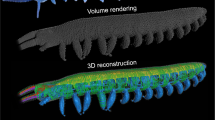Abstract
IT was already shown by Darwin1 that vibracula of all the members of a Bryozoan colony are capable of synchronous movement. This and similar phenomena regarded by Müller (1860) and Hinck (18802) as being due to the action of the “colonial nervous system” are now usually ascribed to a reaction of each member of the colony to a stimulus transmitted through a non-nervous route.
This is a preview of subscription content, access via your institution
Access options
Subscribe to this journal
Receive 51 print issues and online access
$199.00 per year
only $3.90 per issue
Buy this article
- Purchase on Springer Link
- Instant access to full article PDF
Prices may be subject to local taxes which are calculated during checkout
Similar content being viewed by others
References
Darwin, Ch., "Origin of Species" (6th London edition).
Hinck, Th., "History of the British Marine Polyzoa" (London: J. V. Voorst, 1880).
Gerwerzhagen, A., Z. f. wiss. Zool, B, 107 (1913).
Marcus, E., Zool. Jhrb. Abt. f. System., B, 52, H. 1, 4 (1926).
Parker, G. H., J. Exper. Zoology, 5, 31 (1920).
Author information
Authors and Affiliations
Rights and permissions
About this article
Cite this article
HILLER, S. The So-called ‘Colonial Nervous System’ in Bryozoa. Nature 143, 1069–1070 (1939). https://doi.org/10.1038/1431069a0
Issue Date:
DOI: https://doi.org/10.1038/1431069a0
This article is cited by
-
A comparative analysis of the nervous system of cheilostome bryozoans
BMC Zoology (2021)
-
The life of the freshwater bryozoan Stephanella hina (Bryozoa, Phylactolaemata)—a crucial key to elucidating bryozoan evolution
Zoological Letters (2016)
-
The serotonin-lir nervous system of the Bryozoa (Lophotrochozoa): a general pattern in the Gymnolaemata and implications for lophophore evolution of the phylum
BMC Evolutionary Biology (2015)
-
Comparative morphology of the nervous system in three phylactolaemate bryozoans
Frontiers in Zoology (2015)
-
The nervous system of Paludicella articulata - first evidence of a neuroepithelium in a ctenostome ectoproct
Frontiers in Zoology (2014)
Comments
By submitting a comment you agree to abide by our Terms and Community Guidelines. If you find something abusive or that does not comply with our terms or guidelines please flag it as inappropriate.



